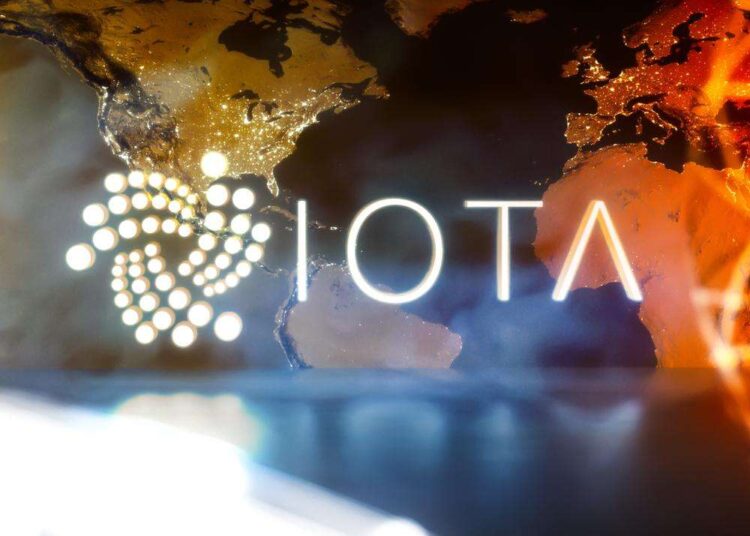- Sustainable blockchain projects have been at the forefront of new developments in the blockchain space with IOTA leading by example.
- IOTA has been collaborating with different stakeholders such as civil society, industries, governments, etc, to build sustainable solutions.
As the crypto industry continues to mature with greater user adoption, more and more projects are moving towards building sustainable solutions. Precisely, this was the reason behind Ethereum (ETH) transitioning from its Proof-of-Work (PoW) consensus model to a more environment-friendly Proof-of-Stake (PoS) consensus model.
On the other hand, Bitcoin has been taking most of the blame with debate over its carbon footprint, as it continues with the PoW consensus model. However, there have been other cryptocurrencies that have been at the forefront of adopting sustainable strategies, with IOTA leading the way. Here are 7 cryptocurrencies that are strong on the sustainability front.
1. IOTA
IOTA is a network that aims to tackle environmental challenges by utilizing low-energy consumption technology. One of its key innovations is the IOTA Tangle, a secure data record that stores environmental information. This enables organizations to make evidence-based decisions and effectively manage natural resources.
In addition, IOTA actively collaborates with various stakeholders, including industries, civil society, and governments, to create collaborative platforms for preserving ecosystems and combating climate change. For example, their partnership with Climate CHECK resulted in the establishment of DigitalMRV, a project dedicated to preventing greenwashing and supporting environmental protection initiatives.
Overall, IOTA’s unique approach to distributed ledger technology, its commitment to inclusivity and energy efficiency, and its collaborations across different sectors position it as a leading force in promoting environmental improvement.
2. Hedera
Hedera is a public network that stands out for being highly sustainable, using very little energy compared to other networks like Ethereum. According to a report by the University College London, Hedera consumes 3,300 times less energy per transaction, making it one of the most environmentally friendly options.
Hedera goes beyond energy efficiency and uses its technology to support fair carbon offsetting markets. It enables the creation and exchange of climate assets, allowing organizations to create carbon offset tokens at favorable rates. Additionally, the Hedera Consensus Service ensures that sustainability data is transparent and trustworthy by creating decentralized and auditable data logs.
By prioritizing sustainability and providing an energy-efficient infrastructure, Hedera actively contributes to environmental efforts. It supports organizations with similar missions and fosters transparency in sustainability data.
This energy-efficient network has attracted startups and organizations working on solutions related to environmental, social, and governance issues. They can leverage Hedera’s low-energy network to build and deploy sustainable solutions while minimizing their carbon footprint.
3. Chia Network
Chia Network is a new platform that uses unused hard drive space instead of energy-intensive mining to secure its network. This makes it much more energy-efficient than Bitcoin, consuming less than 1% of the power. It encourages the use of existing storage resources that are not being utilized.
Additionally, Chia Network is involved in global emissions offsetting efforts. It has a platform called the Climate Action Data Trust for storing environmental data in a transparent and secure way. Chia Network also collaborates with the International Finance Corporation to establish ownership of digital carbon assets.
The technology of Chia Network has been offered to the government of Costa Rica to help manage carbon inventory and facilitate the exchange of carbon credits with partner countries.
4. Powerledger
Powerledger is a company that focuses on renewable energy solutions and creating a more responsive market. They develop tools that allow households and organizations to track, trace, and trade renewable energy, reducing reliance on non-renewable sources like fossil fuels.
Powerledger has partnered with green energy retailers and collaborated with countries worldwide to promote clean energy adoption. They have launched projects in Spain and Chile, enabling residents to trade locally generated renewable energy.
By disrupting traditional energy systems and embracing responsive markets, Powerledger contributes to the global transition to clean and sustainable energy.
5. Energy Web Tokens
The Energy Web Token facilitates the transition to a sustainable and decentralized energy ecosystem using Web3 technologies. It provides solutions for asset management, data exchange, and Green Proofs to support decarbonization efforts globally.
Green Proofs enable enterprises to verify their public decarbonization commitments, such as renewable Bitcoin mining. Energy Web also develops supply chain accounting systems to track and audit clean energy markets, creating demand for low-carbon solutions.
6. Carboncoin
Carboncoin focuses on environmental restoration through tree planting projects and sustainable practices. It generates funding for biodiverse forest planting and rewards those who contribute. The network holds the largest wallet, showcasing its commitment to environmental initiatives.
It also operates the Carbonshopper platform to support businesses with strong environmental ethics. Rather than relying on Carbon Credits, Carboncoin emphasizes the importance of planting biodiverse forests for a greener future.
7. SunContract
SunContract is an innovative energy solution that aims to bridge the gap between energy consumers seeking cost savings and energy producers striving to optimize returns from surplus energy. Its sophisticated power distribution system integrates households and businesses, fostering social, economic, and environmental progress.
The primary goal of SunContract is to have a positive environmental impact by directly connecting consumers with local renewable energy producers. By empowering prosumers, who both generate and consume energy, and providing consumers with the choice to opt for clean energy, SunContract actively contributes to the reduction of carbon emissions. Furthermore, the network’s peer-to-peer energy trading system plays a crucial role in decentralizing the energy grid and encouraging users to actively participate in the energy market.
Crypto News Flash does not endorse and is not responsible for or liable for any content, accuracy, quality, advertising, products, or other materials on this page. Readers should do their own research before taking any actions related to cryptocurrencies. Crypto News Flash is not responsible, directly or indirectly, for any damage or loss caused or alleged to be caused by or in connection with the use of or reliance on any content, goods, or services mentioned.
Credit: Source link














































